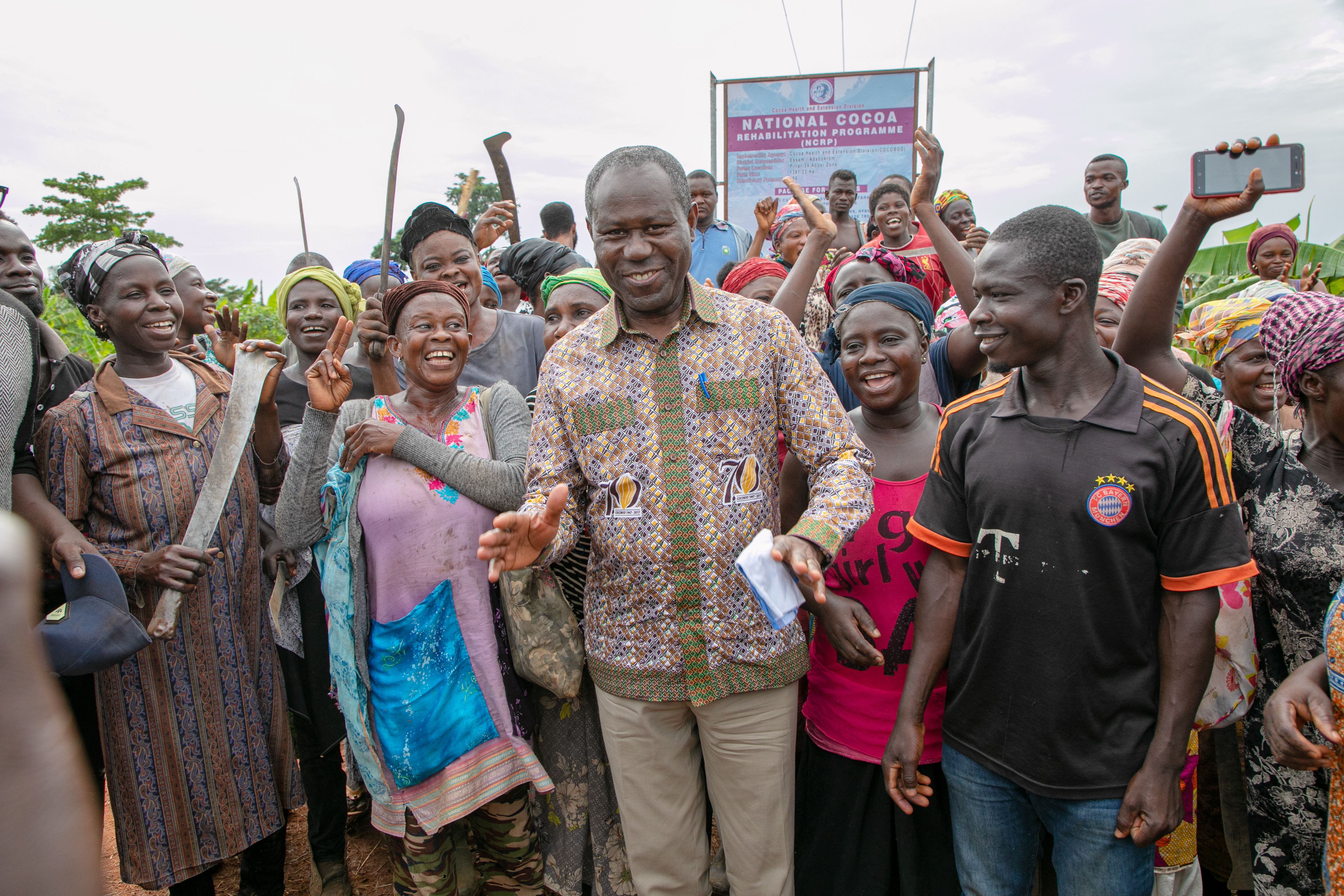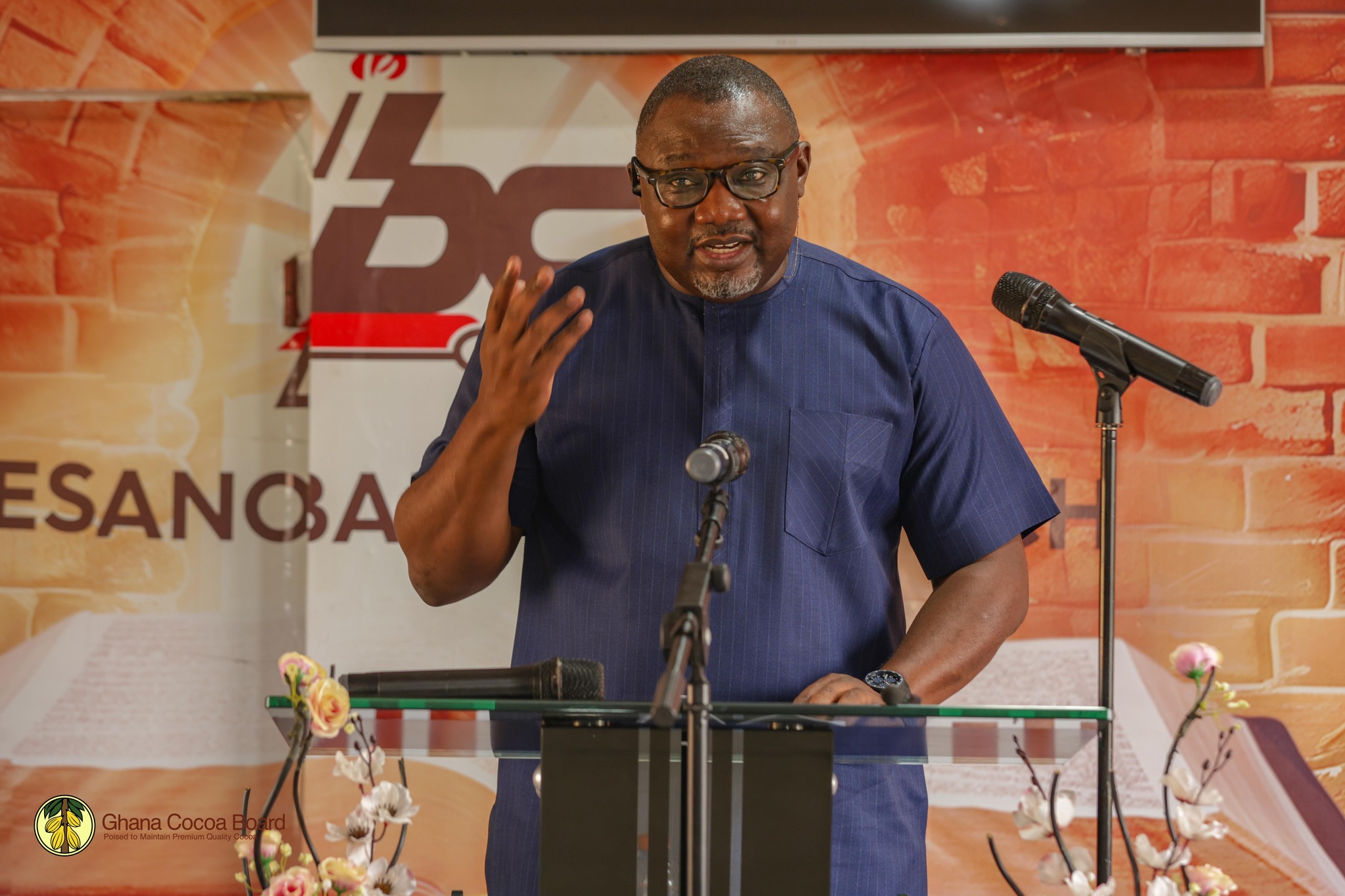COCOBOD TO HAND OVER REHABILITATED COCOA FARMS TO FARMERS

Date: 14th April 2022
Ghana Cocoa Board (COCOBOD) will soon begin the process of handing over the management of rehabilitated cocoa farms to their farm owners.
This comes after a successful two-year-long rehabilitation of hundreds of acres of Cocoa Swollen Shoot Viral Disease (CSSVD) infected farms, under the COCOBOD, and Government funded Cocoa Rehabilitation Programme.
The Chief Executive of COCOBOD, Hon Joseph Boahen Aidoo, made this announcement when he inspected a 145.8-hector rehabilitated cocoa farm at Kumikrom in the Bekwai District of the Western Region.
The inspection was part of a two-day field and farmer-engagement tour of some cocoa communities in the Western North Region. It was also an opportunity for the Chief Executive to check the progress of some cocoa road projects in the Region.
During his interaction with the cocoa farmers at Kumikrom, he disclosed that it was time for early beneficiaries of the rehabilitation programme to take over the care of their farms.
He asked the farmers to adhere strictly to good agronomic and agroforestry practices to ensure that the farms can produce at their optimum capacity without adverse impacts on the environment.
The National Cocoa Rehabilitation Programme, which was officially launched by President Nana Addo Dankwa Akufo-Addo in 2020, was devised by COCOBOD to curtail the rapid spread of CSSVD on cocoa farms.
The process begins with the cutting and chemical treatment of cocoa trees on diseased farms. The farms are then replanted with disease-tolerant, early bearing, high yielding cocoa varieties,
During the two-year-long rehabilitation process, COCOBOD bears the cost of all the activities on the farm and the cost of labour. It also gives an amount of GH₵1000.00 per hector to each farmer who has an infected farm with is being rehabilitated. In the case of tenancy, both affected tenant farmers and their landowners are compensated.
A survey conducted in 2017 found that more than half of the 509,295.53 hectares of cocoa farm in the Western North Region had been infected and nationally 315,886 hectares out of a total of 1.9 million hectares of cocoa farm had been lost to CSSVD.
Consequently, cocoa production in the Western North Region had dropped from over 330,000mt in 2010/2011 to 154,000mt.
Besides the primary goal of stopping the further spread of the disease and restoring the productivity of CSSVD devastated farms, the programme also safeguards the livelihoods of cocoa farmers, helps to ensure better food security through the planting of plantains, tubers and grains, during the first two years as the cocoa trees’ growth.
Hundreds of thousands of jobs have also been created for the youth in cocoa communities, who provide labour and technical support to rehabilitate the cocoa farms.
Other News / Articles you might be interested in.

COCOA MEDIA HUB LAUNCHED TO ENHANCE OPEN GOVERNANCE AND FARMER ENGAGEMENT
Ghana Cocoa Board, along with various stakeholders, has participated in the official launch ...
Read More
COSSA - HEAD OFFICE ELECTS NEW EXECUTIVES
The COCOBOD Senior Staff Association - Head Office (COSSA - Head Office) has ...
Read More
BUNSO COCOA COLLEGE HOLDS 3RD GRADUATION CEREMONY
By Geoffery Opoku-DarkoThe Bunso Cocoa College (BCC), a division of the Ghana Cocoa ...
Read More